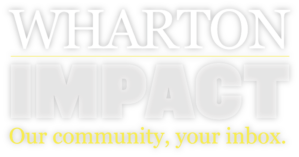May 2022 • Edition 9
In this edition, find out how Wharton brought the wow factor to New York City and learn today what the future of work will look like tomorrow.
Wow for Wharton in NYC!

Wharton delivered the wow factor when the School’s Impact Tour arrived in New York City. Enthusiastic alumni were ready to meet and greet each other — and to hear from thought leaders about how Wharton is thriving.
Dean Erika James was enthusiastically welcomed by the excited crowd — and Michael Platt, Director, Wharton Neuroscience Initiative and James S. Riepe Penn Integrates Knowledge (PIK) University Professor garnered applause for his vision of how the future of work is benefiting from smart brain science interfacing with business.
After welcoming the audience, James said the Wharton 100,000+ alumni network is shaping the future by supporting the School’s students and by developing opportunities for network members. “Each of you are helping to make a difference in the world,” James said.
She also provided an “insider’s perspective” on the state of the School by spelling out her strategic priorities and her roadmap for the future. “We will maintain Wharton’s reputation as ‘The Finance School’; keep Wharton on the cutting edge of the business world by capitalizing on analytics; and focus on entrepreneurship and innovation.
“In addition, Wharton is answering the internal and external calls for guidance in applying the principles of ESG [Environmental, Social, and Governance standards] on campus and in the business world to identify risk and growth opportunities.”
Dean James and Professor Platt then joined in a lively conversation with the audience on how Wharton is supporting the development of new workplace norms that are both good for employees and for businesses. Platt said the future of work is now. He added that by applying brain science, “we are transforming how we think about leadership, team-building, decision-making, innovation, marketing, and so much more.”
The event also featured a short film about the work of the Wharton Neuroscience Initiative and how it is increasing diversity in the field.
There are more Wharton Impact Tour stops coming to cities near you.
The Future of Work is Now

As the world of work evolves, it is more important than ever to seek evidence rather than opinion when considering the questions of how, where, and when we work. This evidence was recently presented and discussed at the inaugural Wharton Future of Work Conference hosted by Wharton People Analytics.
Speakers discussed not only the economics of remote work but also its more intangible upsides for employees and employers. Questions were raised about who benefits from the new “normal” workplace, how businesses cannot afford to ignore the proven increase in productivity, and how a flexible workplace can serve as glue for employee loyalty and longevity.




